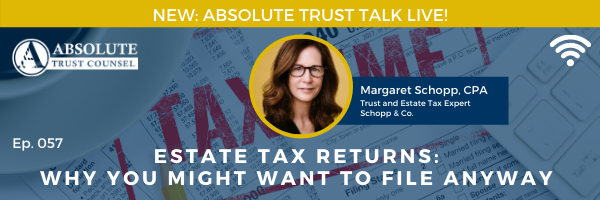Because the federal estate tax exemption is so high, currently set to $11,700,000, many people believe their families won’t have to worry about filing a federal estate tax return (IRS Form 706) on their deaths. And while this may be true to a certain extent, there are also benefits that come with filing an estate tax return that could save your family a lot of money, money that can only be claimed if you file.
In a new episode of Absolute Trust Talk Live, Kirsten sits down with CPA Margaret Schopp. Margaret’s firm, Schopp & Co., focuses on trust and estate returns, including Form 706 for (portability). They work closely with estate planning attorneys and other CPAs who may have an occasional need for a Form 706. Listen in as Kirsten and Margaret break down the estate tax return process, discuss how to calculate it, and review the significant benefits as well as some common mistakes to avoid. Even if you don’t meet the current estate tax exemption, you might want to file anyway.
Big Three from Episode #057:
- The current estate tax exemption is $11.7 million, but that doesn’t mean you shouldn’t file.
- Estate tax returns are not easy, but they are worth it. Margaret’s expert opinion: If you can take advantage, file it.
- An estate tax return is not an income tax return. It’s an inventory of your assets, your deductions. It’s an inventory of who the beneficiaries are and the values at the date of death.
Time-stamped Show Notes:
3:49 – How do we calculate the general estate tax that is owed when someone dies?
8:20 – What are some things that can reduce your assets? These are also known as deductions.
9:27 – Margaret reviews some deductions that people don’t necessarily think about.
12:00 – What is portability?
13:33 – Margaret shares an example of what happens when transferring property to a spouse.
17:46 – How difficult is it to prepare this kind of tax return?
22:14 – Kirsten and Margaret discuss common roadblocks and mistakes people have with filing a 706 tax return form.
24:27 – This form is another big part of filing the 706 tax return.
29:25 – Do you have to get an appraisal of the real estate for the estate tax return, or is it a broker comp letter?
29:56 – Do you include personal possessions, like clothes, jewelry furniture, on the return? And if so, how do you value those?
31:31 – If you do probate, do you have to have the property appraised by a probate referee assigned by the court and use that as the appraisal for your state tax return?
[Ad] Not sure of the benefits of filing an estate tax for your family? We can help. Schedule a free discovery call today, and we’ll review your case to make sure all your needs are met.
Looking for more information on probate? Visit our probate resource page at https://absolutetrustcounsel.com/practice-areas/probate/ for guidebooks, podcasts, videos, and more!
[Ad] The job of a trustee isn’t as easy as one may think. You must give legal notices, retitle assets, file tax returns, understand a legal document, and perform a variety of tasks most people find unfamiliar. As a trustee, if you forget a step or make a mistake, you could be held liable.
Protect yourself, have a plan, and find out the next steps about your specific trust. Get started now by scheduling a 20-minute discovery call with Absolute Trust Counsel. During this introductory call, we will gather information about your trust administration, review our trust administration process with you, and answer any questions you may have. Our goal is to help you get the job done right!

